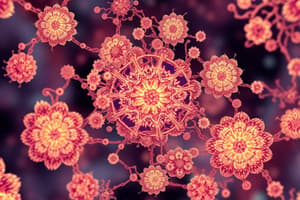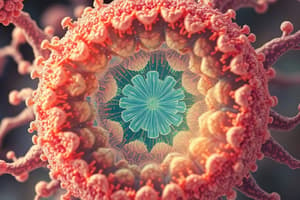Podcast
Questions and Answers
What is the function of the cell membrane?
What is the function of the cell membrane?
- Produces energy for the cell
- Regulates the movement of substances into and out of the cell (correct)
- Stores genetic information
- Synthesizes proteins
Which type of cell division produces genetically identical daughter cells?
Which type of cell division produces genetically identical daughter cells?
- Electrophysiology
- Necrosis
- Mitosis (correct)
- Meiosis
What is the purpose of cell signaling?
What is the purpose of cell signaling?
- To control programmed cell death
- To regulate the electrical properties of cells
- To allow cells to coordinate activities and respond to changes in the environment (correct)
- To produce genetically unique daughter cells
Study Notes
Biology: The Study of Living Organisms
Biology is the scientific study of life and living organisms, their structure, behavior, function, growth, and distribution in the world. It is a vast field with numerous subfields, including cell biology, genetics, botany, zoology, and ecology. In this article, we will focus on cell biology, which is the study of the cell, the fundamental unit of life.
Cell Biology: The Building Blocks of Life
Cell biology is concerned with the structure, function, and behavior of cells, which are the basic units of life. It is a multidisciplinary field that involves aspects of biology, chemistry, and physics. Some key topics in cell biology include:
-
Cell structure: Cell biologists study the structure of cells, including their organelles, membranes, and cytoplasm.
-
Cell division: This process involves the duplication of a cell's contents and the separation of the cell into two identical daughter cells.
-
Cell signaling: Cell signaling is the process by which cells communicate with each other.
-
Cell death: Cell biologists study the various mechanisms by which cells die.
-
Cell growth and development: This involves the process of cell growth and the development of multicellular organisms.
-
Cell biology techniques: Various techniques are used to study cells, such as microscopy, electrophysiology, and gene manipulation.
Cell Structure and Function
The cell is the basic unit of life, and all living organisms are made up of one or more cells. Cells can be classified into three main types: prokaryotic, eukaryotic, and archaeal. Prokaryotic cells are the simplest type of cell, while eukaryotic cells are more complex and contain a nucleus and other membrane-bound organelles. The basic structure of a cell includes:
-
Cell membrane: This is a thin, flexible layer that surrounds the cell and regulates what enters and leaves the cell.
-
Cytoplasm: This is the jelly-like substance inside the cell membrane that contains various organelles and proteins.
-
Organelles: These are specialized structures within the cell that perform specific functions, such as mitochondria, which produce energy, and ribosomes, which synthesize proteins.
Cell Division and Growth
Cell division is the process by which a cell duplicates its contents and separates into two identical daughter cells. This process is essential for growth and development in multicellular organisms. There are two main types of cell division: mitosis and meiosis.
-
Mitosis: This is a type of cell division that produces two genetically identical daughter cells and is used for growth and tissue repair.
-
Meiosis: This type of cell division produces four genetically unique daughter cells and is used for the production of gametes, or sex cells.
Cell growth involves the increase in size and complexity of cells, which is necessary for the growth and development of multicellular organisms.
Cell Signaling and Communication
Cells communicate with each other through a process called cell signaling. This process involves the transmission of a signal from one cell to another, which can result in a response in the receiving cell. Cell signaling is essential for the functioning of multicellular organisms, as it allows cells to coordinate their activities and respond to changes in their environment.
Cell Death
Cell death is the process by which cells die and is a natural part of life. There are various mechanisms by which cells can die, including programmed cell death and necrosis. Programmed cell death is a controlled process that is essential for the development of multicellular organisms, while necrosis is an uncontrolled process that can occur in response to injury or disease.
Cell Biology Techniques
Various techniques are used to study cells, including microscopy, electrophysiology, and gene manipulation. Microscopy is used to visualize cells and their structures, while electrophysiology is used to study the electrical properties of cells. Gene manipulation techniques, such as gene cloning and gene editing, allow scientists to study the function of specific genes and proteins.
In conclusion, cell biology is a fascinating field that provides insights into the structure, function, and behavior of cells, the fundamental units of life. By understanding the basic principles of cell biology, we can gain a deeper appreciation for the complexity of living organisms and the processes that sustain life.
Studying That Suits You
Use AI to generate personalized quizzes and flashcards to suit your learning preferences.
Description
Test your knowledge of cell biology, the multidisciplinary field concerned with the structure, function, and behavior of cells, the fundamental units of life. Explore topics such as cell structure, division, signaling, growth, and techniques used in the study of cells.





